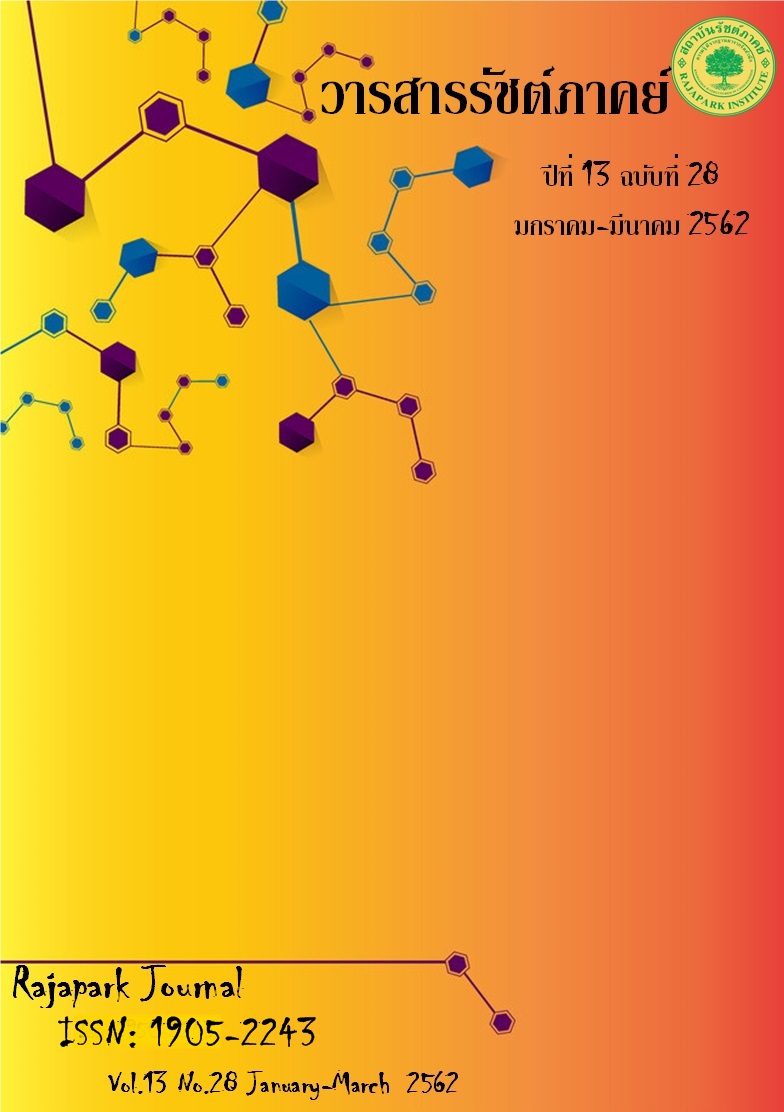Motivation to Work with Earnings
Main Article Content
Abstract
Motivation is one of many factors that help understand the behavior of people in the work that Why are people so diligent Mana diligently and works well. Motivation can help explain the causes of behavior and predict the behavior of individuals. Help explain the differences between people, because those people who have the motivation to do that behavior are different, allowing the person, agency or organization to manage the person or group to have the motivation to perform the desired behavior. In this article, we will talk about internal motivation. And external motivation Will explain the level of motivation By starting from 1) without motivation 2) external motivation Which has a total of 4 levels, 2.1) acceptable levels of external regulations 2.2) regulations that feel self-directed 2.3) regulations that have been passed the characteristics 2.4) integrated regulations And ultimately 3) motivation from within Which motivation from this work will gradually create a process of internal knowledge sealing Elevate yourself from low to high Therefore motivation It is therefore important and necessary for entrepreneurs to have knowledge. Understanding of principles And motivation techniques
Article Details

This work is licensed under a Creative Commons Attribution-NonCommercial-NoDerivatives 4.0 International License.
Views and opinions appearing in the Journal it is the responsibility of the author of the article, and does not constitute the view and responsibility of the editorial team.
References
Campbell. D, & Pritchard, R. (1983). Motivation theory in industrial and organizational psychology. In M. D. Dunnette (Ed.), Handbook of industrial and organizational psychology. Princeton: Van Nostrand.
Deci, E. L. (1971). Effects of externally mediated rewards on intrinsic motivation. Journal of Personality and Social Psychology, 18, 105-115.
Deci, E. L., & Ryan, R. M. (1985). Intrinsic motivation and self-determination in human behavior. New York: Plenum.
Deci, E. L., & Ryan, R. M. (2000). The "what" and "why" of goal pursuits: Human needs and the self-determination of behavior [Electronic version]. Psychological Inquiry, 11, 227-268. Retrieved October 2, 2011, from http://aipa.groups.psychology.org.au/Assets/Files/The-what-and-why-of-goal-pursuits.pdf
Fisher, C. D. (2010). Happiness at work [Electronic version]. International Journal of Management Reviews, 12(4), 384-412. Retrieved January 15, 2012, from http://epublications.bond.edu.au/business_pubs/304
Gorman, P. (2004). Motivation and emotion. New York: Routledge.
Porter, M. E. (1985), Competitive Advantage: Creating and Sustaining Superior Performance. New York: The Free Press.
Pryce-Jones, J. (2010). Happiness at Work: Maximizing Your Psychological Capital for Success. Wiley-Blackwell: UK.
Ryan R. M., & Deci E. L. (2001). On Happiness and Human Potentials: A Review of Research on Hedonic and Eudaimonic Well-Being [Electronic version]. Annual Review of Psychology. 52, 141-166. Retrieved December 9, 2012, from http://www.uic.edu/classes/psych/Health/Readings/Ryan,%20Happiness%20-%20well%20being,%20AnnRevPsy,%202001.pdf
Ryan R. M., & Frederick C. M. (1997). On energy, personality, and health: subjective vitality as a dynamic reflection of well-being [Electronic version]. Journal of Personality. 65(3), 529-565. Retrieved December 12, 2011, from http://onlinelibrary.wiley.com/doi/10.1111/j.1467-6494.1997.tb00326.x/pdf
Shafritz, J. M., Ott, J. S., & Jang, Y. S. (2005). Classics of Organization Theory: Sixth Edition. USA: Thomson Learning, Inc.
Steers, R. M., & Porter, L. W. (1987). Motivation and work behavior. McGraw-Hill, Printed and bound in Singapore by CHONG MOH OFFSET PRINTING PTE LTD.
Warr, P. (2007). Work, Happiness, and Unhappiness. New Jersey: Lawrence Erlbaum Associates.


